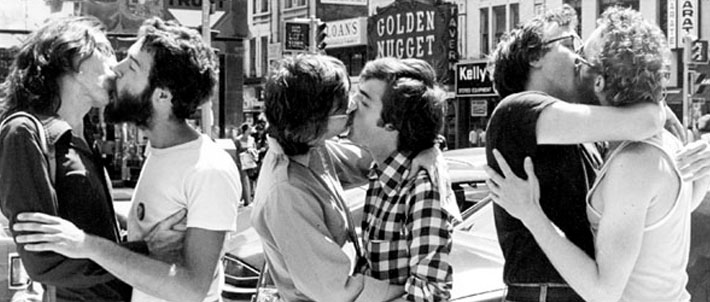Speaking of sexual liberation then and now, I would say this: there is no such thing as sexual liberation these days. When we try and think about sexual liberation today it seems like a very strange concept written in a foreign language; something that is very difficult for a young person to understand. When I’m talking to my classes at Guelph, I try and explain it like this:
“There was a time when people had very different concerns than they do today. That time was called the 60s.During the 60s, people called hippies decided to reject the values of mainstream culture. During the 1950s (the postwar era) people were obsessed with money and creature comforts. Everyone wanted to have 2.5 kids, own a pretty little house, wear attractive clothing, drive a nice car and amuse themselves with latest in electronic devices. (In other words, the 50s was a time very much like our own.)
During the 60s, radical left-wingers (hippies) came along and demanded that people question the origin of their personal wealth and the origin of wealth in general. Could it be that the goods and services they took for granted did not rise out of thin air, but instead their manufacture had to do with the exploitation and oppression of people here and in faraway lands?
So hippies said that the need for greed and luxury should be replaced with the need for something else.
They said — instead of obsessing over new dresses and new cars — people should seek personal fulfillment through, love and sex, and also through experimenting with mind-expanding drugs like LSD. (Remember, it was a very, very different time!) Probably the thing that is hardest for many to understand these days is that sexual liberation meant separating sex from love. Hippies were ‘love children’ and wanted to spread love and experience love, but they believed that sometimes love could be spread simply by having sex. In other words in your relationships with others, you might not always start by falling in love, and then express that love through sex. Instead, people might love many people, and for express that love through sex, without being in love. Having sex with many different people without being in love with them – just enjoying our physical bodies and exploring them — could be as fulfilling, in its own way, as falling in love with someone and getting married.
Another important radical hippie idea was the notion that pleasure is always a good thing — and physical pleasure (especially) is a positive value to be pursued for its own sake.”
This is where my formal student lecture would stop. But I would say to you here on the Buddies’ Blog — on a personal note, that there is an important distinction between promiscuous and polyamourous.
I’m a slut, not polyamourous.
I am in love with only one person, my boyfriend. But I’ve devoted much time to exploring pleasure with many different men. I’ve learned a lot in the process, and had a lot of fun (and continue to do so!). What have I learned from sex? That human beings love to play power games, and that power games are fun; and power SHOULD be a game.
I’ve learned that I’ve always been a little bit afraid of beauty. I’ve learned that I’m an exhibitionist and enjoy showing off my body. And I’ve learned that, in my view, every consensual sex act is an expression of love. Even if you don’t speak to the person you are having sex with – if you’ve both agreed to have sex – yup, it’s a form of love! (Remember what the character Hannah Jelkes says in Tennessee Wiliiams’ play Night of the Iguana, about the underwear salesman who wants to sniff her underpants? “Nothing human disgusts me, Mr. Shannon, unless it’s unkind.”)
So as you can see, times have changed. When people speak of being promiscuous these days, they usually talk about it in the context of polyamourousness – being in love with many different people. I personally think that the present generation is missing out on a lot by ignoring the possibilities for growth and change (and of course – the possibilities for sheer pleasure) that are offered by sexual liberation.



Pingback: Brendan Healy’s postscripts for PIG — Buddies in Bad Times Theatre